Growing Confluence leading India-Kazakhstan Relations to New Strategic Heights
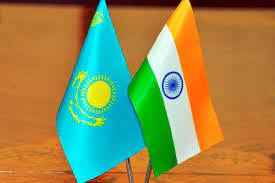
It’s no secret that Kazakhstan has been experiencing a new political and socioeconomic process that came with the change of power. For seven decades, the country was part of the former Soviet Union.
India and Kazakhstan share longstanding historical, cultural, political, and economic relations. India was the first country from the subcontinent to recognise the independence of Kazakhstan in 1991 and established diplomatic relations in 1992, and since then, there has been no looking back.
Over the years, the bilateral relations between the two countries have metamorphosed into the status of strategic partnerships in many areas for mutual benefit.
Kazakhstan is India’s largest trading partner in Central Asia today. Indian exports to Kazakhstan stood at US$207.46 million in 2021, and Kazakhstan’s exports to India were US$1.99 Billion in 2020, according to the United Nations COMTRADE database on international trade.
In the current political, strategic and economic scenario regionally and globally, there is immense potential for the two progressive nations to enhance their engagement and compel New Delhi and Astana to forge more robust and deeper relations.
Let us first evaluate it from the Central Asian Perspective – a region that came into the limelight after the disintegration of the USSR / erstwhile Soviet Union.
Central Asia has always been at the crossroads of regional geopolitics for centuries. With India and Pakistan’s inclusion in SCO (Shanghai Cooperation Organization) in 2017, regional geopolitics in Central Asia has witnessed twists with an unstable Taliban-ruled Afghanistan around. With the recent developments in Afghanistan, American forces’ sudden departure and the Taliban’s takeover, the Central Asian Region (CAR countries) has again surfaced in the CenterStage of world geopolitics. Today, the region has become an area of immense importance to Europe, the USA, Russia, China, Iran, and Turkey.
Kazakhstan – A Strong Economic and Political Power in CAR
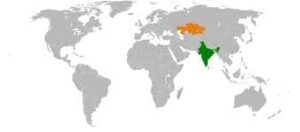
Kazakhstan has a robust economy in the region, producing about 60% of the total production of this region locally. It is famous for the oil and gas industry spread in the country, in addition to its abundant natural resources. Kazakhstan has been the richest, most economically developed and politically reasonably stable since the beginning.
Since its independence in 1991, Kazakhstan has steadily achieved remarkable economic performance. Various economic reforms fueled its rapid growth. A solid domestic demand, backed by a good inflow of foreign direct investment (FDI), has helped the Government reduce poverty and transform the country into an upper-middle-income economy. The nation also has an abundance of hydrocarbon resources.
Kazakhstan has enormous agricultural production potential, with its vast grasslands accommodating livestock and grain production. Kazakhstan has a mixed economic system like India that includes a variety of private freedom combined with centralised economic planning and government regulation.
Kazakhstan, which had successfully managed the three decades of its journey as an independent nation, has become a beacon of stability. The country’s post-Soviet political era was dominated by one political personality, President Nursultan Nazarbayev, till he resigned on March 19. Lately, the current Kazak government, headed by President Kassym-Jomart Tokayev, is trying to put institutional building blocks that could help safeguard stability for the post-Nazarbayev era.
India – Kazakhstan Bilateral Relation: Growing Convergence building Our Strategic Partnership.
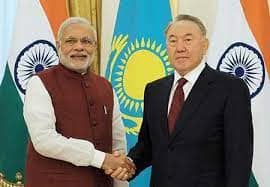
As an emerging global power, India has an ongoing security concern because of cross-border terrorism in Kashmir and the tacit support of Pakistan. Instability in Afghanistan and rising Islamic radicalism in the CAR region and Indian subcontinent are the burning issues for our internal security. A friendly Kazakhstan helps India ensure that the CAR region – our extended neighbourhood- does not fall into the hands of those power inimical to India’s security interests. It is an important factor making Kazakhstan a vital part of India’s foreign policy.
Besides the security aspects, Kazakhstan’s geo-strategic location and geo-political existence (sharing long borders with Russia, China, Europe and other CAR states) make it a country of strategic importance in the present scenario. The Kazak people and the Government feel that the region is being squeezed between China and Russia. Americans have a keen interest here because of its vast natural and energy resources besides its geo-strategic location. A solid Indian presence gives the Kazak government a bigger space to manage and balance between the superpowers well. And as a friendly partner country, India enjoys excellent relations with both Russia and USA.
Kazakhstan is a democratic, secular, constitutional unitary republic. Like India, it has a multi-religious, multi-ethnic, democratic, and secular society. They are also equally concerned about the rise of religious extremism in the region. Kazakhstan never promotes any kind of political Islam, and the Government exercises strict control over radical forces. Kazakhstan is keen to learn from the Indian experiences of religious tolerance, unity in diversity and pluralist democracy. And combating terrorism and radicalism is a priority area of our bilateral cooperation.
Kazakhstan – As India’s Energy suppliers
India is the third-largest energy-consuming country in the world today due to rising per capita incomes and improving standards of living. Energy usage in India has doubled since 2000, with 80% of demand still being met by coal, oil and other biomass. Currently, India heavily depends upon the Persian Gulf region, USA and Russia to meet its growing demand for oil and gas.
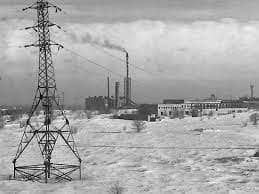
As per the critical energy issues are concerned, Kazakhstan has a crude oil reserve of 30 billion barrels -the 2nd–largest endowment in Eurasia after Russia, besides possible onshore and offshore hydrocarbon reserves, dwarf proven reserves, with an estimated 60-100 billion barrels, mainly in the Kazakh part of the Caspian Sea.
Kazakhstan also has significant natural gas potential. Its proven gas reserves stand at 3 trillion cubic meters, and its projected budget is at 5 trillion cubic meters. (Source: Kazakhstan Country Commercial Guide). Currently, most of India’s natural gas imports are sourced from the Persian Gulf, but India needs to consider an alternative energy source to enhance its energy security. In this respect, the Caspian region can be an alternative energy source for India.
Uranium, a crucial radioactive element, is needed for refuelling nuclear reactors. India sources approx. Eighty per cent of its annual uranium requirement is from Kazakhstan for nuclear power generation. The national Atomic Company Kazatomprom has signed an agreement with India’s Nuclear Power Corporation (NPCIL) to supply 2100 tonnes of uranium and another agreement with India’s Department of Atomic Energy to provide 5000 tonnes over the period 2015-2019.
India has also renewed the pact with the Kazak Govt for uranium supply from 2020 to 2024. India also wanted to expand hydrocarbon cooperation to deliver nuclear fuel and components.
Trade, Tourism and Economy
Kazakhstan is India’s most significant trade and investment partner in Central Asia. As per statistics, Indian Exports to Kazakhstan stood at US$207.46 Million in 2021, and Kazakhstan’s Exports to India were US$1.99 Billion in 2020, according to the United Nations COMTRADE database on international trade. FICCI and the Chamber of International Commerce of Kazakhstan have set up a Joint Business Council (JBC) to promote trade, economic and business investment between the two nations. The council’s second meeting was held in New Delhi on February 16 2018. The 6th chapter of the JWG meeting on Trade and Economy took place in Astana on July 12 2018.
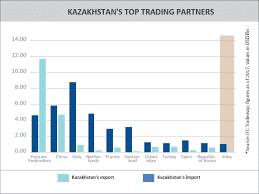
The Agricultural and Processed Food Products Export Development Authority officials from India visited Almaty and Astana in June 2018. They conducted a wet sampling of different varieties of Indian mangoes in Kazakhstan. It was followed by an Indian Tea delegation that visited Almaty in August 2018 and conducted tea promotion events.
The Engineering Export Promotion Council of India (EEPC) participated in the trade shows “Kazbuild” and “Aquatherm” 2019, which were held in Almaty, Kazakhstan, between 4-6 September 2019. Showcasing 30 leading Indian engineering companies. Their product and capabilities are in the areas of Construction material and Equipment, hardware and tools, Roofing and Technology, window Décor, HVAC equipment and Services, Water purification, Accessories and Valves.
A delegation led by CAPEXIL comprising 18 Indian companies exhibited their products at the Kazcomak Expo held in Almaty on 18-20 September 2019 alongside B2B meetings with local business entrepreneurs.
Officials from Kerala tourism, Rajasthan tourism and department of tourism, Govt. of India and private enterprises from the Indian tourism sector attended the PATA Travel Mart 2019 held in Nur-Sultan between 18-20 September 2019 to promote inbound tourism in India.
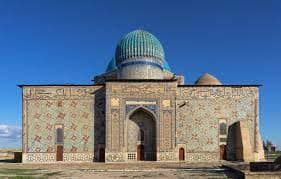
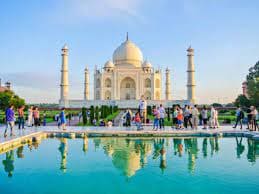
In recent years, we have found that the number of Indian tourists visiting Kazakhstan and Kazakhs travelling to India has increased, except during the pandemic period. Both countries’ governments facilitate electronic visas, and Indian citizens transiting through Nur-Sultan and Almaty can now stay visa-free in Kazakhstan for 72 hours.
Kazakhstan had carried forward economic reforms at a fast pace for years. It has established a developed commercial, legal and regulatory environment. Kazakhstan has been a preferred destination for attracting foreign investment in the Central Asian region and holds second place after Russia in the CIS. The favourable investment climate in the country is due to prevailing good economic and business conditions and factors like Global Competitiveness Index, the Ease of Doing Business Index, the Index of Economic Freedom, etc.
On the economic front, Kazakhstan is of great importance to India. Kazakhstan is the only CAR country with which India has significant trade relations. There are 300-plus Indian companies with Indian capital operating in our country. India’s ISPAT International Consortium has acquired the shares of Karaganda Metal Plant and turned it into a profit-making enterprise. India has invested over $360 million in Kazakhstan in the last two decades. The mutual trade turnover between Kazakhstan and India in 2020 reached almost 2.4 billion US dollars, showing an increase of 27.3% compared to 2019. (Source Kazakh Invest).
Indian companies have been invited to explore opportunities in mining, agriculture and other industries in Kazakhstan.
During Prime Minister Narendra Modi’s July 2015 visit to Kazakhstan, both countries signed up a Roadmap of trade and economic and investment cooperation that includes energy, engineering, metallurgy, IT, chemical industry projects and pharmaceuticals.
During the Kazakhstan-India Investment Forum held on November 12-14, 2019, in Delhi, the two sides discussed many energies, industrial, agriculture, infrastructure and finance projects.
The forum has negotiated with NTPC Limited, Investment Fund of India, Millennial India International Chamber of Commerce, Industry and Agriculture. Kazakhstan is India’s largest trading and strategic partner in Central Asia. Both countries’ cooperation is essential for sustaining mutual economic growth in the increasingly globalised world. (Source Diplomatists)
Defence Cooperation

The Indo-Kazakh Defence Cooperation is guided by the July 2015 agreement on ‘Defence and Military Technical cooperation’ signed between the two nations. The agreement covers joint military education, training, exercises, cadet exchange programs, Military-technical cooperation, and UN peacekeeping. As a part of military cooperation, a Kazakh Armed Forces Unit underwent training on peacekeeping operations in India in April- May 2018 for deployment under an Indian Battalion at the United Nations Interim Force in Lebanon (UNIFIL). KAZIND is an India- Kazakhstan annual bilateral joint exercise between the national Armies. The scope of this exercise includes professional exchange, sharing experiences in Counter Insurgency/ Counter Terrorism operations, and many others relevant to the bilateral cooperation between nations.
“Prabal Dostyk” is another joint military exercise started in 2016. According to India’s Ministry of Defence, this annual exercise provides a unique tri-service training that focuses on counter-terrorism operations in mountainous terrain, and at a high altitude (up to 4000 m), with particular emphasis on promoting interoperability between the armies of India and Kazakhstan.
India Kazakhstan Diplomatic and Strategic Bilateral Relations completing 30 successful Years
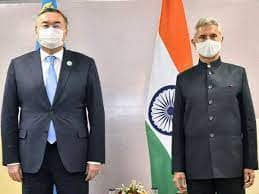
In 2022, India and Kazakhstan are celebrating the 30th anniversary of diplomatic relations. The vibrant thirty years of diplomatic ties between us align with the Indian Government’s decision to hold the first India-Central Asia Summit in a virtual format on January 22 with the state heads. The partnership has grown across a large spectrum of cooperation. Let us look at the media headlines in 2022 that reconfirms the mutual trust, alliance partnerships, concerns and achievement between the Government and the people.
India – Kazakhstan Media Headlines 2022 (Courtesy Economic Times)
⮚ India, Russia and Central Asian Nations to take part in anti-terror exercise at NSG Garrison
Elite anti-terror teams from Russia and the other CAR countries have begun a five-day (October 8-13) joint anti-terror exercise at the National Security Guard (NSG) garrison in Manesar, India.
⮚ Kazakhstan invites PM for CICA’s October summit.
The CICA event, coming close on the heels of the last Shanghai Cooperation Organisation ( SCO) summit, will allow Central Asian countries to expand ties with India.
⮚ Kazakhstan introduces visa-free regime for Indians; woos investments.
According to the Decree 464 of the Kazakhstan Govt dated July 7 2022, the Kazakh authorities have introduced a visa-free entry regime for Indian citizens, allowing Indian citizens a continuous visa-free stay in Kazakhstan for up to 14 days max.
⮚ Foreign-backed radicals tried to make Kazakhstan a failed state: Envoy.
“It is very symbolic that this Summit took place during the 30th anniversary of establishing diplomatic relations between the countries of Central Asia and India. Over the years, we have established a constructive political dialogue and are constantly expanding our multifaceted economic and humanitarian ties. Our vast Asian region has colossal resources and enormous intellectual potential. Important transport corridors and fast-growing markets are concentrated here.”
⮚ India-Central Asia cooperation essential for regional security: PM Modi
The successful virtual Summit saw the participation of five presidents from CAR countries, including Kazakhstan’s Kassym-Jomart Tokayev, Uzbekistan’s Shavkat Mirziyoyev, Emomali Rahmon of Tajikistan, Turkmenistan’s Gurbanguly Berdimuhamedow and Sadyr Japarov of Kyrgyz Republic.
⮚ PM Modi to host first India-Central Asia Summit on January 27
The Summit was held with the participation of the state heads from Kazakhstan, Kyrgyz Republic, Tajikistan, Turkmenistan and Uzbekistan, the MEA said in a statement.
⮚ Kazakh president blames ‘Afghanistan, Mideast’ ultras for riots in the country; India ‘concerned.’
India is closely monitoring the latest developments in Kazakhstan. “We express our deepest condolences to families of the innocent victims who have lost lives in the violence. As a friendly partner of Kazakhstan, we look forward to early stabilisation of the situation,” an MEA spokesperson said
⮚ Strategic partnership with India growing dynamically: Kazakhstan FM
The Kazakhstan Foreign Minister recalled that the inaugural conference held in 2019, and the second meeting held virtually in 2020, provided an excellent platform for an in-depth discussion on topical issues of regional and global agenda, thus facilitating a more robust dialogue and boosting regional connectivity.
India-Kazakhstan bilateral relations are developing at a rapid pace. The future holds tremendous promise and enormous potential. The current global, political, strategic and economic scenario presents an immense opportunity for India and Kazakhstan to enhance their engagement to bring it to a significantly higher level.
India and Kazakhstan are promoters of peace, stability, growth and development in the regions and the world. A Stronger relationship between both nations will further contribute to increasing prosperity and security not only for the peoples of India and Kazakhstan but also for the CAR countries and the world community.
Kazakhstan is on the verge of large-scale political and social changes. India will see how the forthcoming presidential elections in Kazakhstan on November 22, 2022, will pan out for both countries.